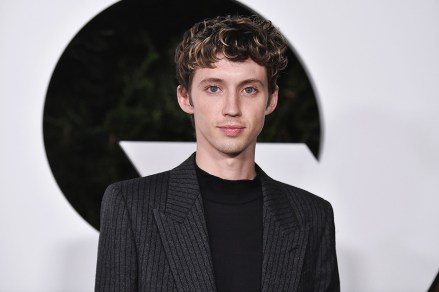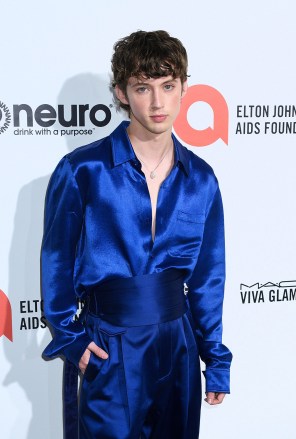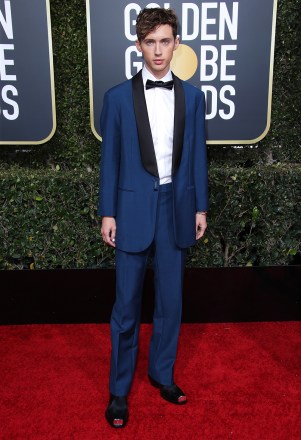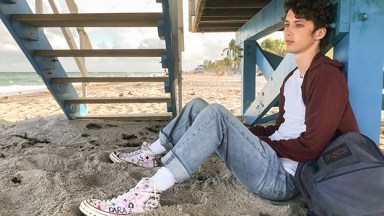
Troye Sivan commands the screen in the new Paramount+ movie Three Months, which is available now. The singer stars as Caleb, a South Florida teen who discovers he’s been exposed to HIV on the eve of his high school graduation. He has to wait three months for his results and learns more about himself during that time than ever before.
HollywoodLife spoke EXCLUSIVELY with the writer and director Jared Frieder about bringing this deeply personal story to life. For Jared, it was “always” Troye to play Caleb, who is the person Jared “wished” he could have been in high school. He also opened up about the decision to not show Caleb getting his final results. Read our Q&A below:
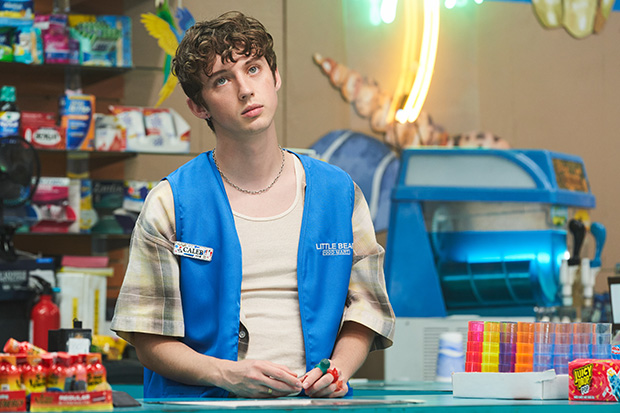
I know it’s been a long time coming with this film and this particular story. What inspired you to write this story?
Jared Frieder: For me, it was important to tell the kind of queer story and write a queer movie that I wished I could have had growing up, that would have made me feel more understood and less alone. So that’s what I set out to do. It’s a story that’s based on events in my own life. I first wrote it like 9 years ago, and since then tried to make it as a movie, tried to make it as a TV show, had my own writers room and a major streamer, then tried to make it as a movie again, [and then] finally got the chance to direct it with my dream cast. We went into production on March 3, 2020, and two weeks in the world shut down and there was a global pandemic. After like 8 or 9 years, I was like, I don’t know if we’ll ever get to finish. It was 6 or 7 months of waiting to find out if a virus would change my life, which is ironically, exactly what this movie is about. And spoiler alert, we got to finish, and it comes out on February 23 on Paramount+. I am so excited for the world to see it.
I know that you wrote it almost a decade ago. The thing I noticed when watching the film is that it seemed timeless. It could have been done in the ’80s in the ’90s, but it’s nearly modern-day. It just felt so timeless, so relevant to today still.
Jared Frieder: Thank you. That means the world. I mean, I really tried to create something that would resonate with all audiences, especially queer kids, of course, but every age, every time, people who’ve experienced every era. For me, it’s these themes of feeling different but learning that things that make you different also make you special, learning that in our modern world with access to health care HIV is no longer a death sentence, and what we really have to focus on is helping fight the shame and stigma around the disease and what it’s like to wait, which is something we’re all experiencing now with the COVID-19 pandemic. Even though we’re waiting, we still have to fight for joy and go after the things we want. These are things that have never been more important than they are now, even though this was a movie set in 2011. It’s so great to hear you say that it resonated and felt timeless because that was exactly what I wanted it to do.
This cast is stacked. Troye is obviously an incredibly talented musician and acted when he was much younger. What was the process of getting Troye? Was he someone that you had in mind? Tell me a little about that process.
Jared Frieder: It was always Troye. It was always Troye for me, even years ago when I first wrote the script. It’s been a dream come true to work with him. I am his biggest fan. He is so talented in every way an artist can be… I think people are going to freak out when they see his performance in this film because he carries this movie on his back and has to access every element of the emotional spectrum to bring Caleb to life. He does it so naturally, so humorously, and so tenderly. He’s a born actor. For me, it was always Troye to play Caleb because I wrote the kid I wished I could have been in high school. He’s fearless and funny, but it’s dealing with themes of abandonment and shame on the inside. Estha was kind of the kid I was in high school, the love interest, so Caleb is the kid I wished I could have been in high school and so is Troye. He’s the cool queer person who I really wanted to be so for him to play this was a no-brainer, and he was such a natural fit. It’s been such a dream come true working with him.
In just the first 15 minutes of the film, he just completely transformed into Caleb. I thought to myself, I know, he’s a very popular singer, but he’s going to be a movie star.
Jared Frieder: Thank you so much. I mean, he is a movie star. He radiates charisma. He’s so magnetic, but he creates a performance that is so honest and grounded. I think it just makes you fall in love with this character and relate to this character. I’m just, again, I’m so excited for people to see him in this role. I think people are going to be shocked.
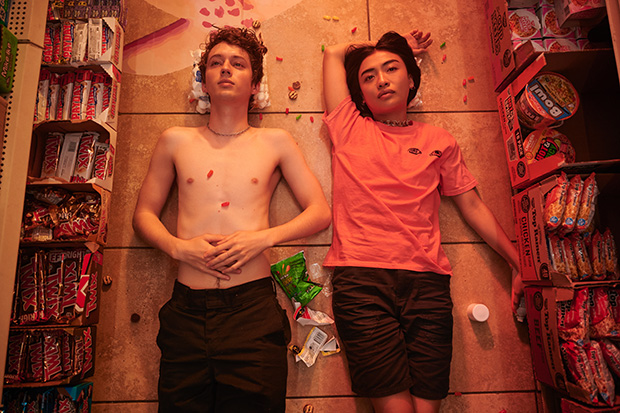
This is his first leading acting role as an adult. It was the perfect role for him to just have this breakout moment in film. I’ve always educated myself about the HIV-AIDS epidemic. The Real World incorporation of Pedro, it was so incredible to bring that back. Was he someone that you watched when you were younger?
Jared Frieder: Pedro Zamora is an icon. He was the first openly pos person on a major television program. The Real World on MTV, which is the studio that I’m so grateful to for making this film with me. He changed the conversation and provided a human face to — at the time — a disease that was really stigmatized. As a queer person, it’s so important for me to pay tribute and honor my queer elders, and the queer people who fought for my rights so that I can enjoy a better life. It was truly so, so crucial for me to honor Pedro in that way in this film, and just show introduce a new generation to him and show how special and groundbreaking he was and honor his memory.
There are so many incredible scenes in this film, but I think the one that just devastated me was the mother and son moment between Caleb and his mother. That was such a turning point in the film. What was that like bringing that to life? It was brutal but just magnificent in its emotional storytelling.
Jared Frieder: Amy Landecker is literally the greatest person alive. She flew out for two days to film this role in the midst of the pandemic without vaccines. Luckily, we were so safe on set. No one got COVID. We followed the strictest safety and testing protocols. I’m so grateful for MTV Studios and my producers, Dan Dubiecki and Lara Alameddine, for helping shepherd us in and finish in the midst of a global pandemic. But I’m also so grateful for Amy to bring her talents and her gifts to this really challenging character in arguably the most important, pivotal moment in the film. It was painful to write. It was painful to shoot. It’s really hard, but that is the experience of so many queer people who are in Orthodox Judaism or some of the more extreme sects of any religion. Many people I knew growing up had to deal with those challenges, and it was really important for me to show what that was like, honestly, while also showing the other loving side of Judaism that his grandma has. Every religion and every culture, it’s not a monolith. There are different ways of interpreting and understanding. We can be religious and treat others with love and come at it from a place of love like his grandma does, rather than a place of fear like his mom does. I don’t even think of her as a villain or antagonist. She’s just someone who’s been through a lot, who’s really afraid, and hopefully, spoiler alert, the box that she does end up sending to him of his father’s stuff… To me, that was like an olive branch for hope for their relationship in the future. Their journey isn’t over.
Throughout the film, we see Caleb’s doctor’s appointments. At the end of the film, we see him go in and meet with Javier Munoz, who’s fabulous as well. We didn’t see the results, per se, but we get the answer in a sense. Why didn’t we see that final moment of the negative results? Why didn’t you feel it was necessary to show?
Jared Frieder: For me, it was important to show that no matter what his status was, whether he was negative or positive, it’s going to be okay. That he’s going to live a fruitful life, that he’s going to find joy, that he’s going to go for his dreams because that’s what the movie’s about, right? Showing that it’s not a death sentence anymore, no matter what. Honestly, when I first started writing this film, that ending was one of the first things I knew had to be a part of this story. For me, it’s about creating a dialogue, starting a conversation, and it really feels like that ending will hopefully create a dialogue around HIV and the shame around it, and that people can still live fruitful, happy lives living with HIV, and I really wanted that to be a part of the conversation.
The scene with Caleb’s grandmother was such a touching moment about love and the power of love sometimes in places that you expected, not expected. I thought that was such a beautiful moment between those two. Ellen Burstyn, she’s an icon and just knocked it out of the park.
Jared Frieder: I framed the poster from Alice Doesn’t Live Here Anymore, which is what she won her Oscar for because she is the greatest thing that has ever happened to me. I mean, I would have never believed you if you had told me 10 years ago that I would get to work with my literal hero of cinema, Ellen Burstyn, in this film, and she would play a character based on my grandma. I still honestly don’t believe that. Every time I watch the movie, I’m like, “Oh my, God, that’s so crazy that she’s in this.” I can’t speak highly enough about her. Obviously, she is beyond.
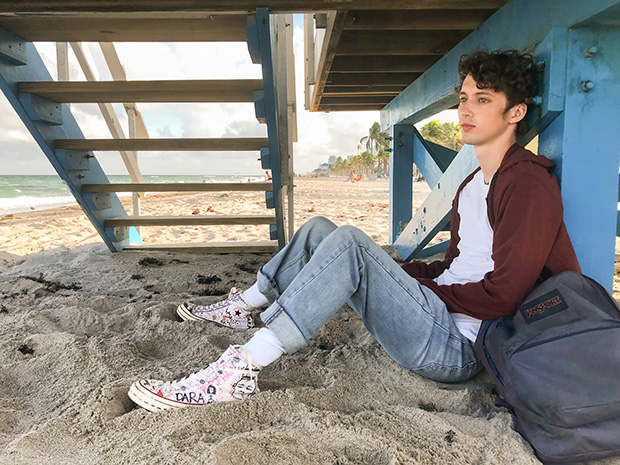
Troye wrote two original songs for this film. As someone who created this story, who brought these characters to life, how did you feel listening to those songs that Troye wrote for this film?
Jared Frieder: I cannot even tell you. Truly, I almost passed out. I remember when he sent me the first song “Wait,” which plays in the film during the resolution montage after the scene with his grandma when he gets the box of stuff. I was walking through the streets of Studio City where I live, and I was so transfixed. I didn’t realize that I didn’t have the crosswalk sign and almost truly got hit by a car that night. But that’s how taken I was by the music and the messaging. He wrote both songs from Caleb’s perspective, which as a fan of Troye as a musical artist, is like bucket list. It will never get better than Troye Sivan bringing his immense musical gifts to this film by writing from the perspective of a character I created. I owe him my firstborn. I’m so over the moon, and the songs are bops. Bop, bop, bop city. People are going to explode.
